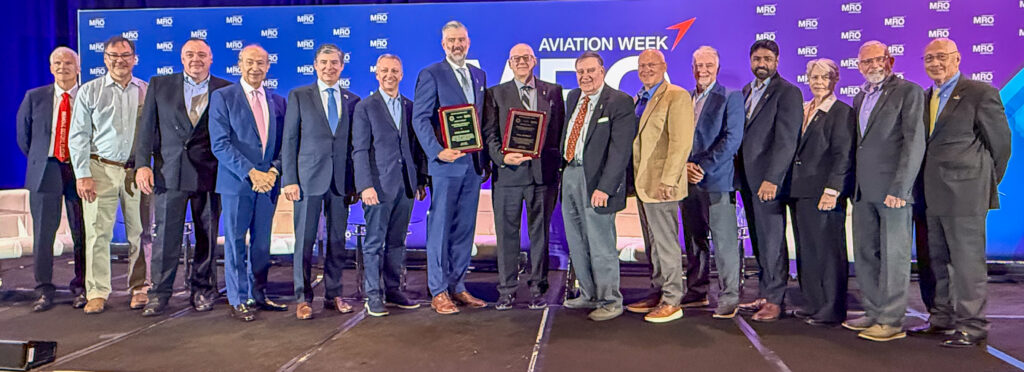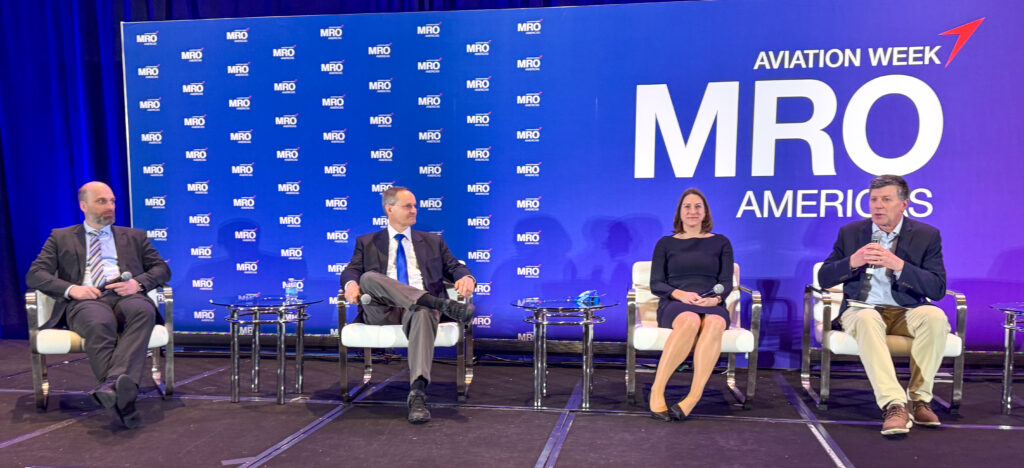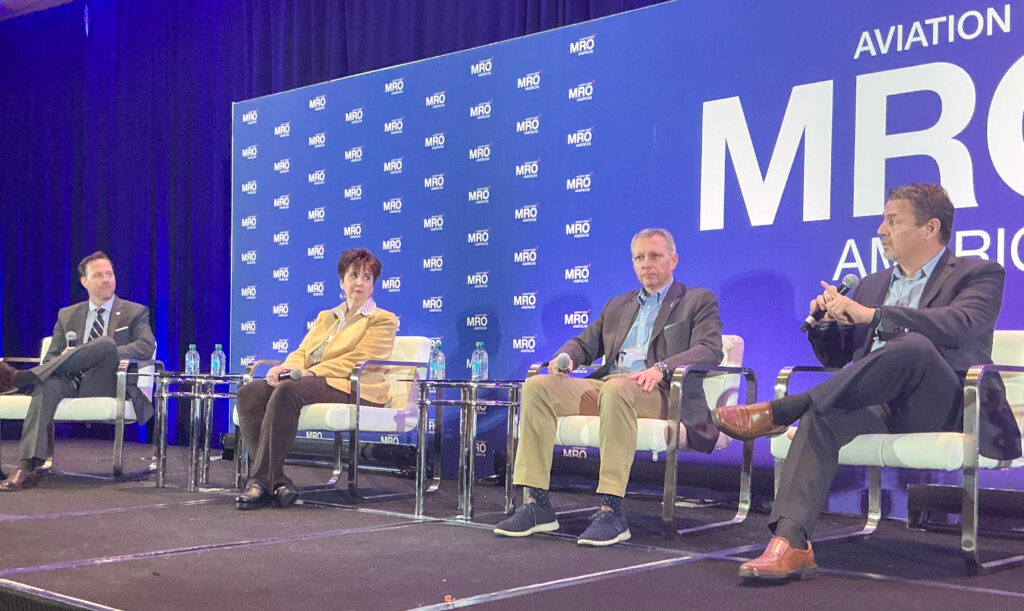Industry Insights
Airlines for America Joins World’s Largest Gathering of Aviation Maintenance Community
April 16, 2025
U.S. airlines joined companies from across the aviation maintenance and supply chain in Atlanta at Aviation Week Network’s MRO Americas April 8-10, the largest annual gathering of the aviation maintenance community in the world.
More than 17,000 registered attendees from 92 countries attended this year’s conference, bringing together original equipment manufacturers (OEMs), regulators, suppliers, lessors and service providers to discuss the latest trends, technologies and strategies in commercial aviation maintenance, repair and overhaul (MRO).
A4A has been a purposeful partner with Aviation Week for several years, presenting the 59th annual Nuts and Bolts Awards and participating in several panel discussions in Atlanta this year.
59th Annual Nuts and Bolts Awards

The MRO Americas conference kicked off with a special presentation of the Nuts and Bolts Awards to this year’s recipients — Greg Colgan, CEO, MRO Holdings, Inc., and Paul Schmitz, Southwest Airlines Aviation Maintenance Technician (AMT).
Colgan, who leads MRO Holdings, one of the largest MRO organizations helping to accomplish heavy maintenance across several airlines’ fleets, was praised for his years ensuring the company’s long-term value and quality in its work for customers.
Schmitz — a 30-year industry veteran — was personally recognized by A4A Managing Director of Engineering & Maintenance, Justin Madden, as an early influence in his career and the careers of many other AMTs.
A4A invited past recipients of the Nuts and Bolts Awards to join this year’s recipients on stage for a group photo followed by the annual alumni luncheon.
Airline environmental panel
A4A Vice President, Environmental Affairs, and Chief Sustainability Officer Kevin Welsh joined a panel of speakers from among U.S. airline fleet and sustainability personnel to discuss efforts to reduce the industry’s environmental impact and progress along the way to the industry’s goal of net-zero carbon emissions by 2050.
The speakers stressed the need for more market measures and policy incentives for sustainable aviation fuel (SAF), a crucial asset for the industry’s ambitious 2050 net-zero carbon emissions goal.
While SAF is priced higher than conventional jet fuel, government and market incentives have enabled airlines to increase the use of the fuel, but more support will be necessary in the years to come.
Cory Boese, Southwest Airlines fleet chief, and Karen Blanks Ellis, FedEx’s chief sustainability officer and vice president of environmental affairs, each shared the work their carriers have achieved.
In addition to investing in SAF production and expanding market access, carriers are actively working to minimize their environmental impact across all operational areas. This includes upgrading aircraft to newer engines with lower emissions and fuel burn, increasing efficiency and reducing fuel burn during taxiing and deplaning at the gate.
“If you look at the U.S. aviation sector over the last 20 years, we’re carrying around a third or more passengers and cargo than we were 20 years ago, but emissions have remained about the same over that period,” Welsh said. “The U.S. aviation sector has significantly improved its fuel efficiency over the last 20 years.”
Welsh discussed multiple long-term fronts that airlines are advancing to reduce environmental impact, including the aerodynamic shape of the aircraft and development of blended-wing aircraft.
The ever-evolving cybersecurity threat

A4A Managing Director, Cybersecurity, Marty Reynolds moderated a panel discussion at MRO Americas concerning the ever-evolving threat landscape that airlines face in an era defined by increasingly sophisticated cyber actors.
The importance of instilling operational resilience among MROs is only more apparent, and organizations must coordinate with multiple government agencies, frameworks and regulations in order to protect against threats.
Jennifer Toren, Alaska Airlines director of information security, stressed the need for regulators to work with stakeholders to create unified regulation standards to better ensure compliance and increase the focus on future and evolving threats.
Dan Diessner, executive director at Embry Riddle Aeronautical University, and Stefan Schwindt, senior principal for aerospace cybersecurity with GE Aerospace, both highlighted the importance of standards.
“Standards setting organizations continue to play a critical role in protecting the aviation sector,” Reynolds said. “Having participation from airlines, OEMs, academics and MROs is vitally important to ensure the industry stays ahead of the threats.”
The panel also emphasized the importance of information sharing and harmonization of regulations in the U.S. and with and among international member states. Reynolds stressed, “The complexity of today’s threat environment with the expanding digital connectivity makes the need for simplified, harmonized regulations even more important.”
“Don’t compete on safety, don’t compete on security. We’re in it together,” said Schwindt.
A4A’s Engineering Maintenance & Material Council (EMMC) shapes the future of TechOps

Madden closed out the MRO Americas conference with two panel discussions with U.S. airline TechOps leaders from A4A’s EMMC and other airlines to discuss fleet dynamics and how operators are making investment decisions on technology and their workforce to ensure future resilience.
Meeting quarterly, members of the EMMC have cooperated on numerous engineering and maintenance issues ranging from leading the evolution of integrated aircraft health monitoring (IAHM) to addressing critical spectrum issues among many others.
Madden and panelists talked about the council’s role in maintaining cooperation among airlines to work proactively with stakeholders on consensus issues, like interpreting and implementing new FAA guidance and the sharing of recommended practices towards the continuous improvement of safety in the national air space (NAS).
For the closing discussion, panelists shared potential solutions to the expected drop in AMTs entering the workforce in the next 10 years.
Dave Marcontell, JetBlue’s vice president of technical operations, pointed to a need for more practical commercial aviation experience from students emerging straight from AMT schools.